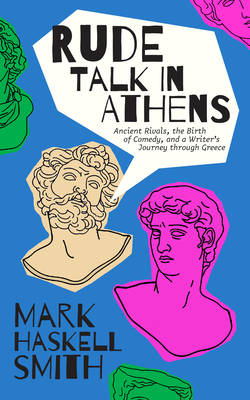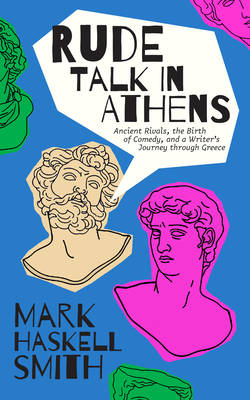
- Retrait gratuit dans votre magasin Club
- 7.000.000 titres dans notre catalogue
- Payer en toute sécurité
- Toujours un magasin près de chez vous
- Retrait gratuit dans votre magasin Club
- 7.000.0000 titres dans notre catalogue
- Payer en toute sécurité
- Toujours un magasin près de chez vous
Rude Talk in Athens
Ancient Rivals, the Birth of Comedy, and a Writer's Journey Through Greece
Mark Haskell Smith
Livre relié | Anglais
29,95 €
+ 59 points
Description
"Rude Talk in Athens is brave, brilliant, and incredibly funny. There are loads of very specific characters, including Mark himself. It's the Mark Haskell Smith version of hanging out with Stanley Tucci and Anthony Bourdain, but in present day and ancient Greece. I agree with everything he says about comedy and have never read anything like it." ―Barry Sonnenfeld, Film Director and author of Barry Sonnenfeld, Call Your Mother: Memoirs of a Neurotic Filmmaker In ancient Athens, thousands would attend theatre festivals that turned writing into a fierce battle for fame, money, and laughably large trophies. While the tragedies earned artistic respect, it was the comedies--the raunchy jokes, vulgar innuendo, outrageous invention, and barbed political commentary--that captured the imagination of the city.
The writers of these comedic plays feuded openly, insulting one another from the stage, each production more inventive and outlandish than the last, as they tried to win first prize. Of these writers, only the work of Aristophanes has survived and it's only through his plays that we know about his peers: Cratinus, the great lush; Eupolis, the copycat; and Ariphrades, the sexual deviant. It might have been the golden age of Democracy, but for comic playwrights, it was the age of Rude Talk.
Watching a production of an Aristophanes play in 2019 CE and seeing the audience laugh uproariously at every joke, Mark Haskell Smith began to wonder: what does it tell us about society and humanity that these ancient punchlines still land? When insults and jokes made thousands of years ago continue to be both offensive and still make us laugh?
Through conversations with historians, politicians, and other writers, the always witty and effusive Smith embarks on a personal mission (bordering on obsession) exploring the life of one of these unknown writers, and how comedy challenged the patriarchy, the military, and the powers that be, both then and now. A comic writer himself and author of many books and screenplays, Smith also looks back at his own career, his love for the uniquely dynamic city of Athens, and what it means for a writer to leave a legacy.
The writers of these comedic plays feuded openly, insulting one another from the stage, each production more inventive and outlandish than the last, as they tried to win first prize. Of these writers, only the work of Aristophanes has survived and it's only through his plays that we know about his peers: Cratinus, the great lush; Eupolis, the copycat; and Ariphrades, the sexual deviant. It might have been the golden age of Democracy, but for comic playwrights, it was the age of Rude Talk.
Watching a production of an Aristophanes play in 2019 CE and seeing the audience laugh uproariously at every joke, Mark Haskell Smith began to wonder: what does it tell us about society and humanity that these ancient punchlines still land? When insults and jokes made thousands of years ago continue to be both offensive and still make us laugh?
Through conversations with historians, politicians, and other writers, the always witty and effusive Smith embarks on a personal mission (bordering on obsession) exploring the life of one of these unknown writers, and how comedy challenged the patriarchy, the military, and the powers that be, both then and now. A comic writer himself and author of many books and screenplays, Smith also looks back at his own career, his love for the uniquely dynamic city of Athens, and what it means for a writer to leave a legacy.
Spécifications
Parties prenantes
- Auteur(s) :
- Editeur:
Contenu
- Nombre de pages :
- 203
- Langue:
- Anglais
Caractéristiques
- EAN:
- 9781951213343
- Date de parution :
- 17-08-21
- Format:
- Livre relié
- Format numérique:
- Genaaid
- Dimensions :
- 128 mm x 206 mm
- Poids :
- 294 g

Les avis
Nous publions uniquement les avis qui respectent les conditions requises. Consultez nos conditions pour les avis.






